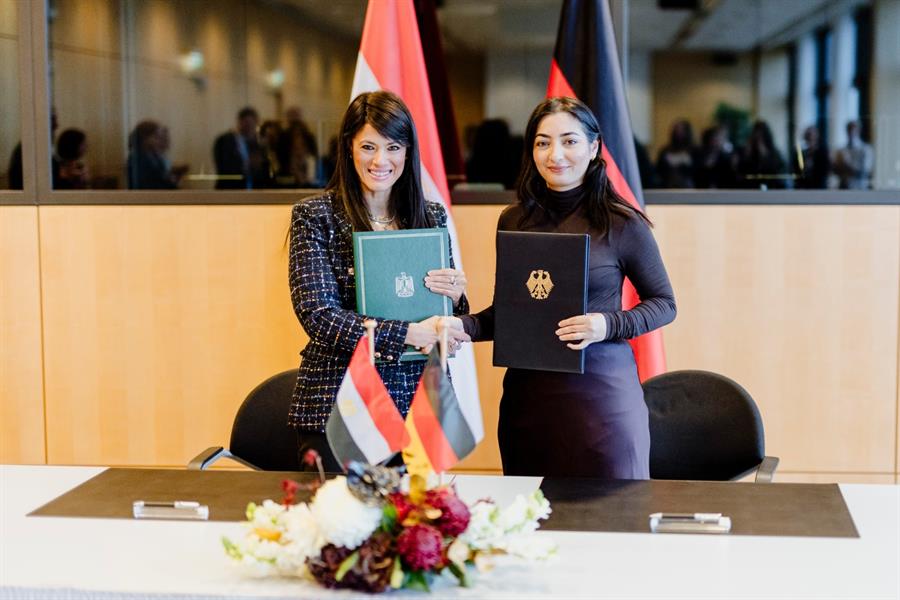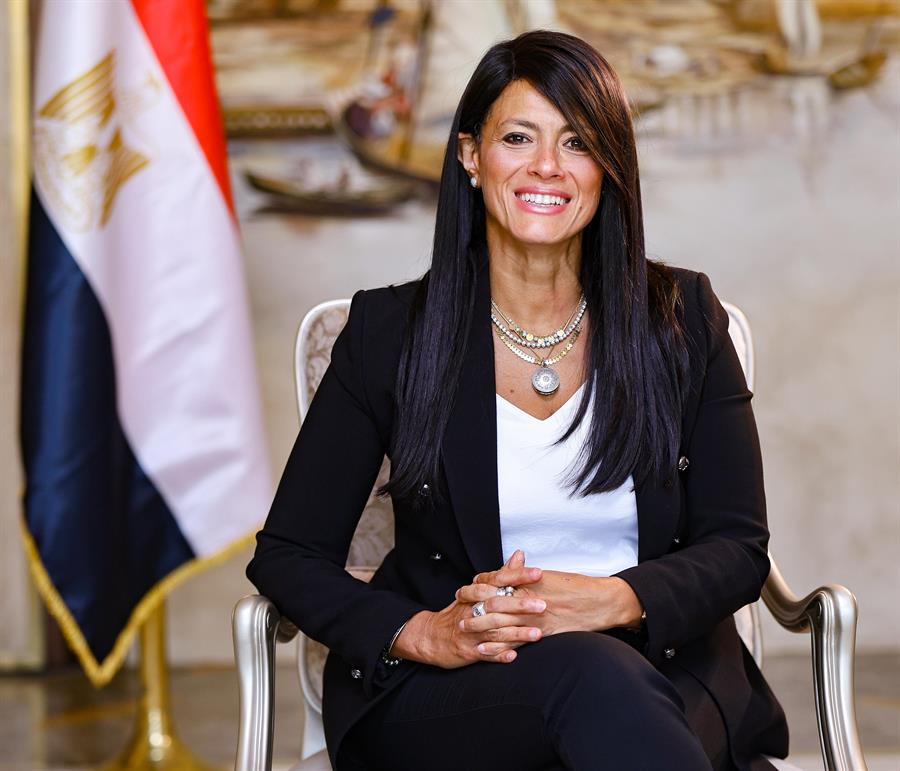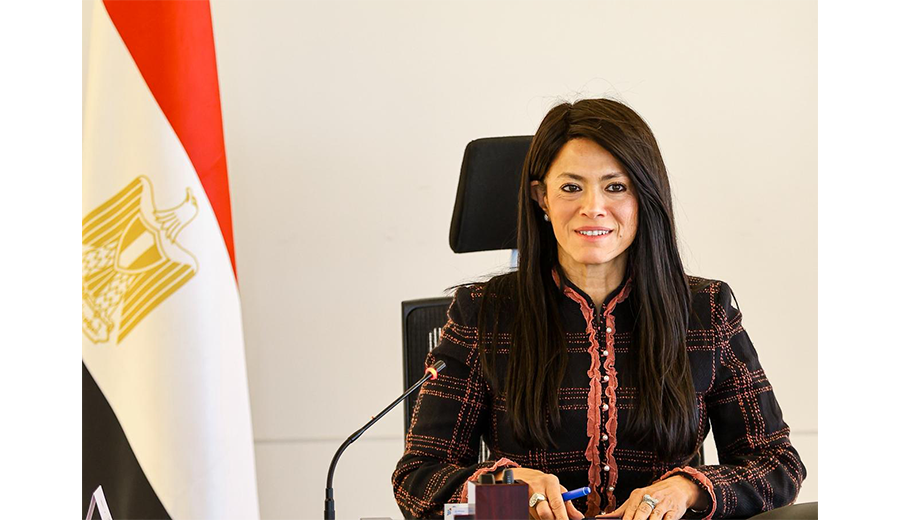Statement by the Minister of Planning, Economic Development, and International Cooperation during the Annual Conference "The Path to Net Zero," organized by Chapter Zero Egypt
04 November 2024
Hosting the COP27 climate conference enhanced Egypt’s international presence in efforts to combat climate change.
The new planning law integrates climate considerations into the selection and implementation of investment projects.
A constructive partnership between the public and private sectors is essential to address climate change.
The "NWFE" program serves as a platform to attract private sector investments in mitigation and adaptation projects and to enhance climate resilience in Egypt.
There is a need to expand financing for development and climate action to support emerging countries.
H.E. Dr. Rania A. Al-Mashat, Minister of Planning, Economic
Development, and International Cooperation, participated in a discussion
session on "Climate Risks" during the annual conference "The
Path to Net Zero," organized by Chapter Zero Egypt. The conference
addressed the journey toward sustainability and how companies can manage the
opportunities and challenges posed by climate risks, as well as adopt climate
governance principles in their strategies and identify available financing
opportunities for board members and CEOs.
H.E. Dr. Mahmoud Mohieldin, UN Special Envoy for Financing
the 2030 Agenda of Sustainable Development, UN Climate Change Champion,
delivered the opening remarks. The discussion session included Dr. Mohamed
Farid Saleh, Chairman of the Egyptian Financial Regulatory Authority, Mr. Helmy
Ghazi, Deputy CEO and Head of Global Banking Services at HSBC Egypt, Mr.
Sebastian Riez, President and CEO of Schneider Electric for North-east Africa
and Levant Cluster, Mr. Hossam Seifeldin, Executive Vice President and CEO of
Capgemini. The session was moderated by Prof. Sabrina Bruno, Co-Founder and
Governing Board Member of the Climate Governance Initiative and Founder of
Chapter Zero Italy.
At the outset of H.E.’s remarks, Dr. Rania Al-Mashat
expressed gratitude to Engineer Ahmed El-Sewedy, Chairman of Chapter Zero
Egypt, noting that this initiative reflects a commitment to enhancing climate
action and supports the private sector’s journey in Egypt toward sustainable
development. She emphasized that Egypt’s hosting of COP27 was not merely a
significant event, but the beginning of a new phase that positioned Egypt among
the influential countries in climate dialogue and action to address climate
challenges, in partnership with various stakeholders, including government entities,
the private sector, civil society organizations, and non-profit organizations.
H.E. Dr. Al-Mashat added that successive climate conferences
have underscored the importance of partnerships among relevant stakeholders to
tackle climate change. She highlighted that Egypt, during its hosting of COP27,
demonstrated the significance of working with a wide range of stakeholders to
address the three fundamental pillars: adaptation, mitigation, and equitable
financing. These principles are central to Egypt’s climate strategies, making
it vital to integrate these priorities not only into government policies but
also into private sector strategies. By aligning the efforts of both the public
and private sectors, constructive partnerships can be formed to achieve our
goals in the fields of climate and sustainability.
The Minister of Planning, Economic Development, and
International Cooperation explained that, in line with these efforts, Egypt
launched its National Climate Change Strategy 2050 prior to COP27, which serves
as a national roadmap guiding the country toward fulfilling its nationally
determined contributions (NDCs) in accordance with the Paris Agreement.
H.E. Dr. Rania Al-Mashat emphasized the ministry's pivotal
role in promoting collaboration among ministries and relevant authorities to
integrate climate considerations into national planning frameworks. H.E. noted
that this role aligns with the ministry's strategic direction following the
merger of the ministries of Planning, Economic Development, and International
Cooperation, thereby expanding its responsibilities in developing and
monitoring economic and social development plans and programs across various
timeframes, as well as working toward achieving the Sustainable Development
Goals.
H.E. Dr. Al-Mashat referred to the sustainability and
financing framework for economic development launched by the ministry, which
aims to achieve qualitative, sustainable, and inclusive economic growth through
evidence-based economic policy formulation. This framework seeks to provide
information that enhances discussions on needs and opportunities, bridging gaps
in various development fields, building a resilient economy, and enhancing
macroeconomic stability by implementing structural reforms to increase
competitiveness, improve the business environment, support the resilience of
macroeconomic policies, transition toward a green economy, and mobilize
domestic and external financing to achieve sustainable development through an
integrated national financing framework that promotes resource allocation to
priority sectors and stimulates private sector investments.
H.E. Minister Al-Mashat asserted that adapting to climate
change is a core element in achieving “high-quality economic growth” and
ensuring resilience.
H.E. Dr. Al-Mashat emphasized the necessity of incorporating
climate and nature-related risks into national investment plans to guarantee
the sustainability of projects and minimize adverse environmental impacts on
future generations.
The Minister of Planning, Economic Development and
International Cooperation added that the new Planning Law No. 18 of 2022
reflects this direction by integrating climate considerations into its
executive regulations, including environmental impact as part of project
selection criteria, in addition to providing comprehensive feasibility studies
that encompass economic, social, and environmental aspects to ensure all
proposed projects align with sustainable development goals and add value to the
national economy while preserving the environment.
H.E. Dr. Al-Mashat explained that the national investment
plan aims to support the implementation of the National Climate Change Strategy
2050 by directing public investments toward projects that aim to mitigate and
adapt to the effects of climate change. These projects span multiple sectors,
including infrastructure, renewable energy, sustainable agriculture, and water
resource management.
H.E. Dr. Al-Mashat also mentioned the role of the country
platform for the “NWFE” program, launched by Egypt during the climate
conference, which represents a constructive model for encouraging private
sector investments in mitigation and adaptation projects.
H.E. Minister Al-Mashat clarified that, in the context of
efforts to enhance environmental sustainability, the green component is being
integrated into major national projects, foremost among them the "Hayah
Karima" initiative, aimed at achieving balanced and inclusive development
that contributes to improving citizens’ quality of life while preserving the
environment.
H.E. Dr. Al-Mashat emphasized the importance of the
principle of “Just Financing,” highlighted during COP27 through the launch of
the Sharm El-Sheikh Guidebook for Just Financing, which serves as a tool aimed
at mobilizing available financing from international financial institutions,
with a focus on achieving equity and providing opportunities for all. H.E. Dr.
Al-Mashat pointed out that many developing countries, including Egypt, face
unique challenges in accessing climate financing.
H.E. Dr. Al-Mashat noted Egypt’s participation in the
upcoming Global Financing for Development Conference scheduled to be held in
Seville in June, emphasizing its importance in discussing pressing issues at
various levels of development. She reiterated the need to expand financing for
development and climate action to support emerging countries.









